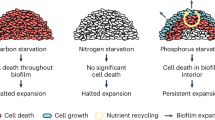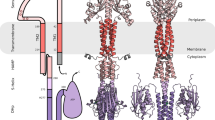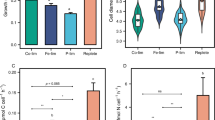Abstract
THE nutrient requirements of the autotrophic nitrifying bacteria are simple, but among the elements which seem to be essential for them are phosphorus and magnesium. Bömeke1 reported that Nitrobacter would not grow in media from which either phosphate or magnesium was omitted; and Nitrosomonas would not grow in medium with magnesium omitted. Wimmer2 found that phosphate was necessary for the growth of both organisms, but the minimum requirement was only 0.02 mgm. phosphorus per litre for both Nitrobacter and Nitrosomonas.
This is a preview of subscription content, access via your institution
Access options
Subscribe to this journal
Receive 51 print issues and online access
$199.00 per year
only $3.90 per issue
Buy this article
- Purchase on SpringerLink
- Instant access to full article PDF
Prices may be subject to local taxes which are calculated during checkout
Similar content being viewed by others
References
Bömeke, H., Arch. Mikrobiol., 14, 63 (1949).
Wimmer, G., Z. Hyg., 48, 135 (1904).
Jensen, H. L., Nature, 165, 974 (1950).
Meiklejohn, J., J. Gen. Microbiol. (in the press).
Author information
Authors and Affiliations
Rights and permissions
About this article
Cite this article
MEIKLEJOHN, J. Minimum Phosphate and Magnesium Requirements of Nitrifying Bacteria. Nature 170, 1131 (1952). https://doi.org/10.1038/1701131a0
Issue date:
DOI: https://doi.org/10.1038/1701131a0
This article is cited by
-
Predicting the efficacy of the nitrification inhibitor dicyandiamide in pastoral soils
Plant and Soil (2014)
-
Phosphate requirements of the nitrifying bacteria
Antonie van Leeuwenhoek (1967)



